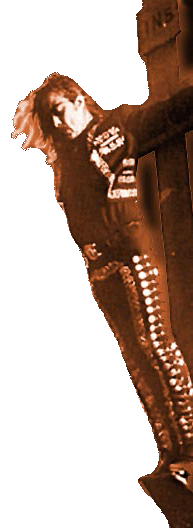Guillermo Gómez-Peña
 Born in 1955 and raised in Mexico City, Gómez-Peña came to the US in 1978. His work, which includes performance art, video, audio, installations, poetry, journalism, and cultural theory, explores cross-cultural issues, immigration, the politics of language, "extreme culture" and new technologies in the era of globalization. A MacArthur fellow, he is a regular contributor to the national radio news magazine All Things Considered (National Public Radio), a writer for newspapers and magazines in the U.S. and Mexico, and a contributing editor to The Drama Review (MIT).
Born in 1955 and raised in Mexico City, Gómez-Peña came to the US in 1978. His work, which includes performance art, video, audio, installations, poetry, journalism, and cultural theory, explores cross-cultural issues, immigration, the politics of language, "extreme culture" and new technologies in the era of globalization. A MacArthur fellow, he is a regular contributor to the national radio news magazine All Things Considered (National Public Radio), a writer for newspapers and magazines in the U.S. and Mexico, and a contributing editor to The Drama Review (MIT).
For twenty years, Gómez-Peña has been exploring intercultural issues with the use of mixed genres and experimental languages. Continually developing multi-centric narratives and large-scale performance projects from a border perspective, Gómez-Peña creates what critics have termed "Chicano cyber-punk performances," and "ethno-techno art." In his work, cultural borders have moved to the center while the alleged mainstream is pushed to the margins and treated as exotic and unfamiliar, placing the audience members in the position of "foreigners" or "minorities."
He mixes English and Spanish, fact and fiction, social reality and pop culture, Chicano humor and activist politics to create a "total experience" for the viewer/reader/audience member. These strategies can be found in his live performance work, his radio chronicles, his award-winning video art pieces, and his five published books. Through his organization La Pocha Nostra, Gómez-Peña has focused very intensely in the notion of collaboration across national borders, race, gender and generation as an act of citizen diplomacy and as a means to create “ephemeral communities.”
Gómez-Peña’s performance and installation work has been presented at over seven hundred venues across the U.S., Canada, Mexico, Europe, Australia, the Soviet Union, Colombia, Puerto Rico, Cuba, Brazil and Argentina (see below).
Among numerous fellowships and prizes, Gómez-Peña was a recipient of the Prix de la Parole at the 1989 International Theatre of the Americas (Montreal), the 1989 New York Bessie Award, and the Los Angeles Music Center’s 1993 Viva Los Artistas Award. In 1991, Gómez-Peña became the first Chicano/Mexicano artist to receive a MacArthur Fellowship (1991-1996). In 1995, he was included in The UTNE Reader’s "List of 100 Visionaries." In 1997 he received the American Book Award for The New World Border. In 2000, he received the Cineaste lifetime achievement award from the Taos Talking Pictures film festival.
Chronicles, essays and scripts of his large-scale projects can be found in five of his books: Dangerous Border Crossers (Routledge, 2000), Codex Spangliensis (City Lights, 2000), Mexican Beasts and Living Santos (PowerHouse, 1997), The New World Border (City Lights, 1996) and Warrior for Gringostroika (Graywolf, 1994).
The film version of his solo performance Border Brujo (in collaboration with Isaac Artenstein), was awarded first prize in the 1991 National Latino Film and Video Festival and first prize in the category of "Performance Film" at Cine Festival (San Antonio 1991). His videos, El Naftazteca: Cyber Aztec TV for 2000 AD and Temple of Confessions were awarded first prizes at Cine Festival in San Antonio, Texas in 1996 and 1998, respectively. In 2001, his film Borderstasis was awarded the prize for "best performance video" from the Vancouver Video Poetry Festival. His work was recently featured in the HBO special "Americanos."
Gómez-Peña’s experimental radio works have received the following honors: Border Notebooks won the Silver Award in Performance/ Spoken Word Category from the Corporation for Public Broadcasting in 1991. We Don’t Speak English Only, Vato! was awarded first prize by the National Association of Community Radios in 1993. Menage-à-Trade received the Golden Reel Award in 1995. A collection of audio work entitled Borderless Radio was released on compact disk by Toronto’s Word of Mouth in 1995. Apocalypse Mañana, his latest audio CD was recently published by Calaca Press.
International festivals and biennials that have featured his work include:
The International Theatre Festival of the Americas. Montreal 1988
The Demons of Los Angeles. France, Spain, Sweden 1989
The 1989 Bienal de la Habana, The Decade Show, New York 1990
Time Festival. Gante, Belgium 1990
EDGE ’90. Newcastle, England, 1990
The Los Angeles Festival. Los Angeles 1990 and 1993
The Next Wave Festival. Brooklyn Academy of Music New York 1991
The Festival of the Worlds. Finland 1991
EDGE ’92. Madrid, London 1992
The Sydney Biennial. Australia 1992
Whitney Biennial, New York 1993
Fundación Banco Patricios. Buenos Aires, 1993
Rompeforma, Puerto Rico 1993
The Hamburg Theatre Festival. Germany, 1993
LIFT. London 1993 and 1995
Banff Centre, Canada 1994
3er Festival de Performance. Mexico City 1994
Ante-América. Colombia, Dominican Republic, Mexico and the US 1994
Helsinki Act, Finland 1995
X-Teresa Museum, Mexico city 1995
Corcoran Gallery of Art, Washington DC 1996
5Cyberconf. Madrid 1996
Polverigi Theatre Festival. Italy 1996
Szene Festival. Salzburg, Austria 1996
ARS Electronica. Lintz, Austria 1997
Root/less Festival. Hull, England 1997
Inroads, Arts International. Miami 1998
Caribe 2000. San Juan Puerto Rico, 1999
Sonart. Barcelona, Spain 1999
Diaspora. Oviedo, Spain, 1999
Eventa 5, Sweden 2000
Encontro Hemisferico. Rio de Janeiro, Brazil 2000
International Theater Festival, Havana, Cuba 2001
EXPERIÈNCIES: Barcelona Art Report, Spain 2001
Ayuntamiento de la Gran Canaria, Canary Islands 2001
Performance Space, Sydney, Australia 2001
Espacio C, Santandar, Spain, 2001
Confrontations Festival, Lublin, Poland
Muffat Halle, Munich, Germany, 2001
Encontro Hemisferico. Lima Peru, 2002
Liverpool Biennale. 2002
House of World Cultures, Berlin, 2002
Tate Modern, 2003
 |
© 2001 Pocha Nostra